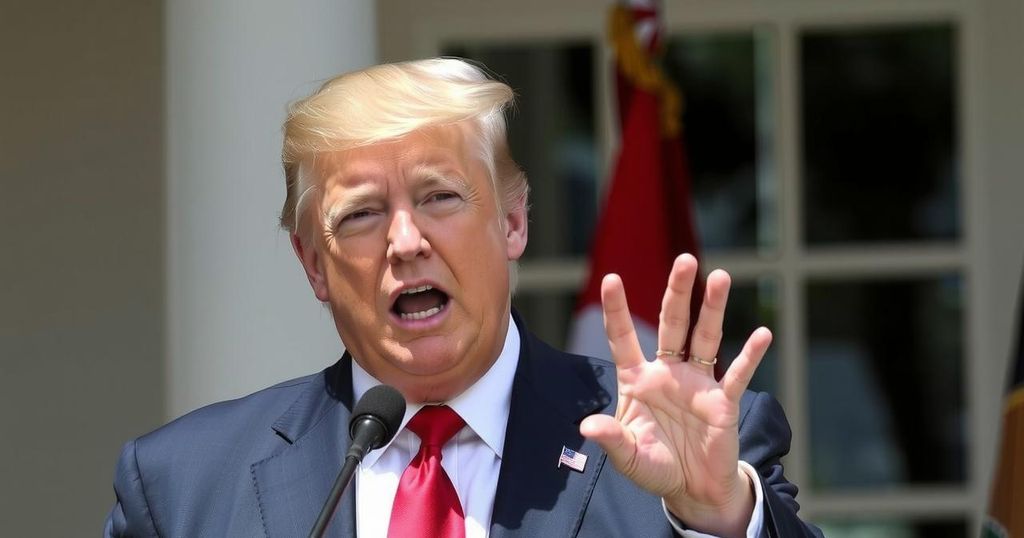Trump’s Ambiguous Stance on Syrian Crisis as He Assumes Office
Upon taking office, President-elect Trump will need to address the Syrian crisis, a situation marked by rebel control and increased complexity. His public statements suggest a strong inclination towards a non-interventionist policy, consistent with his views on U.S. foreign involvement in the Middle East. Nominating Tulsi Gabbard as director of national intelligence further reinforces this strategic direction. With a critical view of prolonged military engagements, Trump appears prepared to advocate for a hands-off approach to Syria and its ongoing civil war.
As President-elect Donald J. Trump prepares to take office, he faces the complexities of the ongoing crisis in Syria, a nation now largely governed by rebel factions with underlying terrorist affiliations. Trump’s approach to this tumultuous region remains ambiguous, particularly as he suggests a reluctance to intervene, supported by strong opinions from his advisors and political allies. Known for his critical view of U.S. interventions in the Middle East, he refers to Syria as a “land of sand and death.” In previous statements, he has declared that American involvement in Syria is unnecessary, emphasizing that the conflict should not concern the United States. Furthermore, he plans to nominate Tulsi Gabbard, a vocal opponent of U.S. involvement in Syria’s civil war, as director of national intelligence. This nomination aligns with his possible preference for a non-interventionist foreign policy.
As the Syrian civil war—ongoing since 2011—continues to evolve, President-elect Trump inherits a highly volatile situation. The ongoing struggles between various factions, including groups that may have terrorist connections, complicate any potential responses from the incoming administration. Trump’s perceived disdain for involvement in foreign conflicts underscores his inclination to adopt a passive stance. His previous remarks on social media aptly illustrate this perspective, as he encourages the notion that the U.S. should refrain from interference. The appointment of individuals such as Ms. Gabbard to significant positions within his administration may hint at a broader strategic philosophy that prioritizes American disengagement from international conflicts, especially those rooted in prolonged instability.
In the context of American foreign policy, the history of U.S. involvement in the Middle East is marked with failed interventions aimed to reshape regimes in countries like Iraq and Libya. Trump’s rhetoric often critiques these engagements as “endless wars,” portraying a profound skepticism about America’s roles and responsibilities abroad. As rival factions contest control of Damascus, Trump’s statements reiterate his intentions of minimal involvement, urging that this conflict be allowed to occur without interference from the United States. It remains to be seen how these ideas will manifest into actionable policies as Trump transitions from president-elect to president.
The article discusses the challenges that President-elect Donald J. Trump will encounter regarding the ongoing conflict in Syria as he assumes office. Since the outbreak of civil war in 2011, Syria has become engulfed in violence, leading to complex power dynamics involving various rebel groups, some of which possess terrorist affiliations. Trump’s previous statements reflect a strong inclination towards non-involvement, stemming from a broader critique of U.S. interventions in the Middle East, which he refers to as misguided efforts that have led to prolonged military engagements. His appointment of advisors with similar perspectives will likely influence his administration’s policy decisions on Syria and the Middle East.
President-elect Donald J. Trump’s approach to Syria appears to emphasize a strong preference for non-involvement, reflecting his general skepticism towards American foreign interventions. As he sets to take office, the circumstances in Syria present a multifaceted crisis that will require careful navigation. His interactions with advisors and the policies established in his administration will be critical in determining how the United States will engage with or disengage from the conflict-ridden region.
Original Source: www.nytimes.com




Post Comment